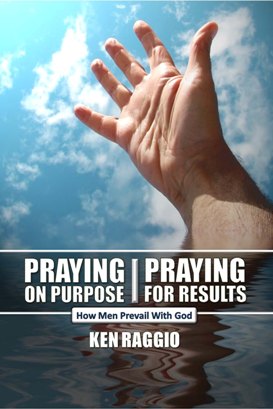SEE COMPLETE LIST OF ARTICLES ON HOME PAGE
 From Ken Raggio's Book:
From Ken Raggio's Book:
"Praying On Purpose, Praying For Results"
Chapter 15
Life-or-Death Prayers
by Ken Raggio
On October 14, 1987, an 18-month-old toddler named Jessica McClure of Midland, Texas fell into an abandoned well. Her frantic young mother called, and within minutes, rescue workers began arriving on the scene. For the next 58 hours, a tense drama ensued. Little Jessica had been playing in the yard with other small children. Her mother left them briefly to go into the house and answer the phone, when somehow the well's covering, apparently an old flower pot, was removed, and the child fell into the well.
When they finally found her, she had fallen down an 8-inch-wide casing to around 22 feet deep. One leg had been pinned upward against her chest, restricting its circulation. They lowered a microphone down the shaft and Andy Glasscock, a local policeman, spent most of those three days laying on his stomach trying to maintain communications with the child.
Rescuers were forced to drill another shaft parallel to the one she was in. They had to dig below the point where she was, to prevent the shaft from collapsing on top of her. The drilling was long and tedious, due to a layer of extremely hard rock that quickly wore down the bits that were being used. One worker after another was dropped into the shaft with jackhammers and drills, and pulled back to the surface completely exhausted.
Television crews quickly moved in, and CNN provided round-the-clock world-wide coverage of the episode. The crowd of rescue personnel, media reporters, and local residents was so large that few people would leave the scene for fear of not being able to return. Many from the media who had come from great distances were never able to get close to the scene.
Around the world, "Baby Jessica" provoked an outpouring of prayers and sympathy. Rescuers could not give her food or water, not knowing the extent of her injuries. They believed she could survive three or four days without water. They lowered a hose for fresh air, and another with warm air to prevent hypothermia. From Wednesday morning to late Friday evening, the intense drama dragged on.
Finally, at noon on the third day, drillers completed the rescue shaft, and a larger horizontal tunnel at the bottom for easier access. Reporters stood on ladders around the perimeter trying to catch a glimpse of what was going on.
Robert O'Donnell was chosen to make the rescue, because he was thin - six feet tall and 145 pounds. He did not tell anyone that he was claustrophobic. According to Lisa Belkin of the New York Times, O'Donnell "lay down on his back and wriggled head first through the cross-tunnel, with his arms out in front of him. The air was wet and sticky, and within moments he was bathed in sweat. It was like trying to slither through a tightly wrapped sleeping bag, he would tell reporters later."
He wormed his way through the tunnel until he reached the shaft that held Jessica. She was wedged against raw rock above him. He could see one leg dangling, but she was in a split. He spoke to her using the nickname her parents told him to use. "Juicy, I'm here to help you."
He tugged on her foot. She was stuck too tightly, and he had no space to maneuver. He cursed. Then he prayed. Finally, he realized that he could not move her. He had to go back up the shaft so the diggers could widen the tunnel. He promised her that he would be back, and they lifted him out.
They almost refused to let him make the second try, because doctors felt that he was too distraught. But he prevailed.
For the second time, he disappeared down the hole. When he reached the end of the tunnel, he coated the walls with K-Y lubricating jelly. He pulled on her, moving her just a fraction of an inch with each tug. Finally, she worked loose, and dropped into the tunnel with him - nose to nose.
"You're out, Juicy," he told her. He wiggled back through the tunnel, where another paramedic, Steve Forbes, waited behind him with a backboard used for accident victims. Workers lifted Steve and Jessica up the shaft, 29 feet, where the entire world was awaiting.
One photographer, who would later win a Pulitzer Prize for his photograph, stood in the basket of a local telephone company cherry picker overlooking the well, and snapped the photo as Jessica, wrapped in gauze, first appeared in daylight.
ABC, NBC and CBS networks all interrupted their programming to make the announcement. "Live, and direct from Midland, Texas," Dan Rather said, "Jessica McClure is up. She's alive. What a fighter."
O'Donnell paused for a few moments, still in the tunnel, getting his thoughts together. "I was totally exhausted. Totally elated, too. I've saved other people's lives before, but they'll never be anything like this again."
When Jessica emerged, church bells rang all around Midland. Her rescue was credited mostly to paramedic Robert O'Donnell and police officer William Andrew Glasscock, Jr.
"Baby Jessica" is now a grown woman, married and mother of a child.
For years, Robert O'Donnell was bombarded with media attention for his heroic act. The daring rescue itself, coupled with the unbelievable bombardment of media inquiries, produced what doctors called Post-Traumatic Stress Disorder in Robert. He struggled with emotional issues for years. Then, in 1995, O'Donnell put a .410 shotgun in his mouth and committed suicide. Saving the baby's life ultimately cost Robert his life.
The same man who had so heroically wormed his way down into a would-be tomb to free an 18-month-old baby girl, at long-last, succumbed to the trauma of the entire experience.
Not just anyone could do what Robert O'Donnell did that day. I, for one, could never descend into such a shaft because I would be entirely too claustrophobic. My body could not withstand the anxiety of such close quarters.
But miraculous rescues take place in the world somewhere every single day. How many times has some ordinary person experienced a sudden rush of adrenaline and "super-humanly" lifted a vehicle off of a victim lying under it? How many times a day do firefighters plunge into a burning inferno to save the life of some stranded person? How many times do Coast Guard personnel rescue a drowning one at sea, or a helicopter pilot rescue a mountain climber or a skier from an avalanche?
If you live long enough, you will eventually awaken one day to discover that someone you love dearly has fallen down a well of sin. You will literally be shocked with the horror that is unfolding. At first, you may try to deny it. Your belief system may be temporarily suspended. Then the reality that your loved one is in a life-or-death, Heaven-or-Hell crisis will occur to you.
You will not have to debate within yourself what to do. You will look at that hole in the ground, and nothing on earth can keep you from going down into it. No matter that you are claustrophobic. No matter that it will put your own life at risk. There is only one reality. Your loved one has to be saved.
Upside down into the darkness you go. It is a race against the clock. It is now or never.
If you don't pray, somebody is going to die and go to Hell. If you don't pray, Satan is going to abduct the very one whose soul means more than all the world to you. If you don't pray, you will never be able to forgive yourself for not trying.
That is the kind of praying that Jesus Christ did when He showed up at midnight in the Garden of Gethsemane. He told His disciples to sit and wait while He went to pray. He took only Peter, James and John. Then He began to be sorrowful and very heavy. He said, "My soul is exceeding sorrowful, even unto death: tarry ye here, and watch with me. And he went a little further, and fell on his face, and prayed, saying, O my Father, if it be possible, let this cup pass from me: nevertheless not as I will, but as thou wilt." His sweat was like drops of blood.
Jesus went down the shaft. He put our needs ahead of His own. He knew that He was going to die, but there were souls to save, and He was the only one who could save them. Nobody could comprehend the trauma He was going to endure. The cursings. The beatings. The stripes and the wounds and the pain and the blood. The nails. The thorns. The cross. The darkness. The earthquake. The horror of it all.
But three days later, He returned from the hole in the earth.
Your passionate, gut-wrenching prayers are going to be effectual. Your tears are going to touch the heart of God. Your agony in the face of devastating defeat is going to produce a triumph greater than anything you ever imagined.
When it is over, you will face the conflicting emotions of great joy over your victory, and great exhaustion from the effort.
In the end, you may feel as though you can never endure another ordeal such as that. But pray on. As long as you live, you are an intercessor.
Pray for your family. Pray for your friends. Pray for your neighbors. Pray for your nation and for all those who have rule over you. Pray even when it feels like you are sweating blood.
When you see those precious souls returning from what seemed to be certain destruction, the exhilaration of it all will be a great reward.
But that is not all. When you stand in the presence of Almighty God someday, and look around and see all the souls who were saved from death, your reward will be eternal in the heavens.
Therefore...
Pray. Pray as if it is a matter of life or death. Because it is.
I am continually writing new content for this site.
Please return often for more material,
and tell your friends about
www.kenraggio.com
, too!
THANKS!
And God bless you!
Ken Raggio

|
|



